Key takeaways:
- Flexibility and adaptability are crucial for handling last-minute venue changes, allowing planners to create innovative solutions.
- Effective communication is essential; keeping all stakeholders informed reduces anxiety and builds trust during unexpected changes.
- Learning from past experiences helps develop contingency plans, empowering planners for future challenges.
- Fostering a collaborative atmosphere among team members during stressful transitions enhances problem-solving and strengthens team dynamics.
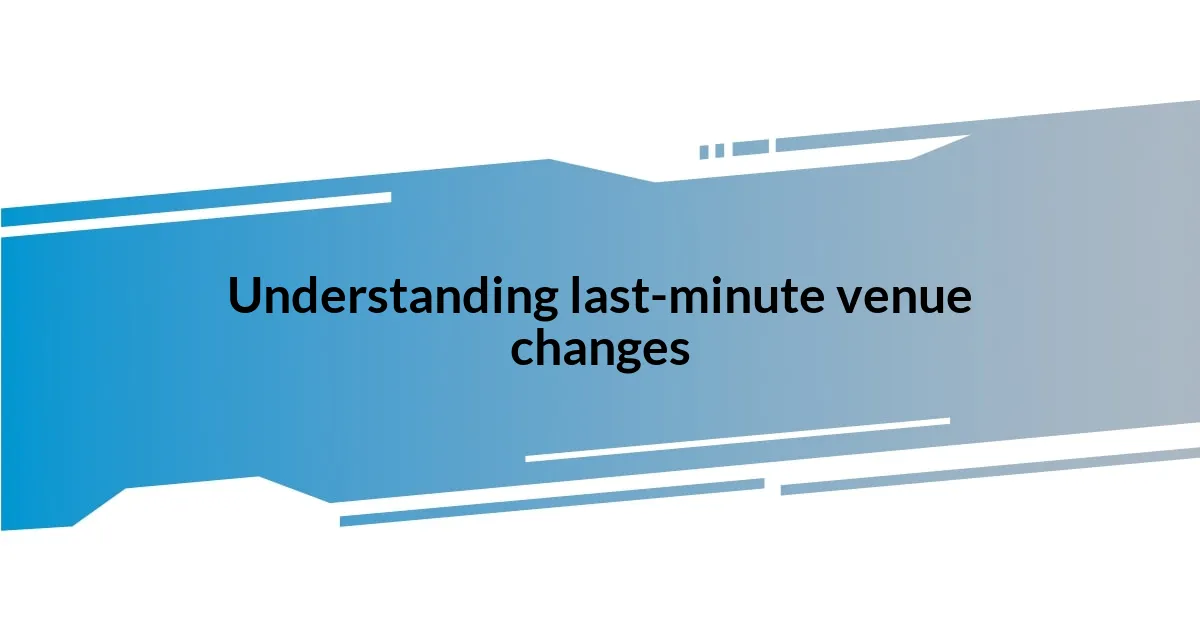
Understanding last-minute venue changes
Last-minute venue changes can throw even the most organized planner into a tailspin. I remember one event where, just two days before, the venue I had booked underwent a sudden renovation. Imagine the panic that set in as I scrambled to find an alternative space that would accommodate all of our needs.
It’s easy to overlook how often a situation like this can arise. I often wonder, how many planners really account for the possibility of unexpected changes? Experience has taught me to build flexibility into any event plan. When that renovation hit, instead of stressing over the details, I focused on adjusting the floor plan and communicating updates quickly. That shift in mindset made all the difference, helping me manage not only the logistics but also my emotions during the process.
In my view, understanding the reasons behind last-minute changes can help demystify the chaos. Weather emergencies, double bookings, or even a shift in the host’s objectives can all play a part. It reminds me of how our plans can sometimes feel like they’re in the hands of fate. Have you ever felt that jaw-tightening twist when things don’t go as planned? Embracing the unexpected can lead to creative solutions and ultimately, remarkable outcomes.
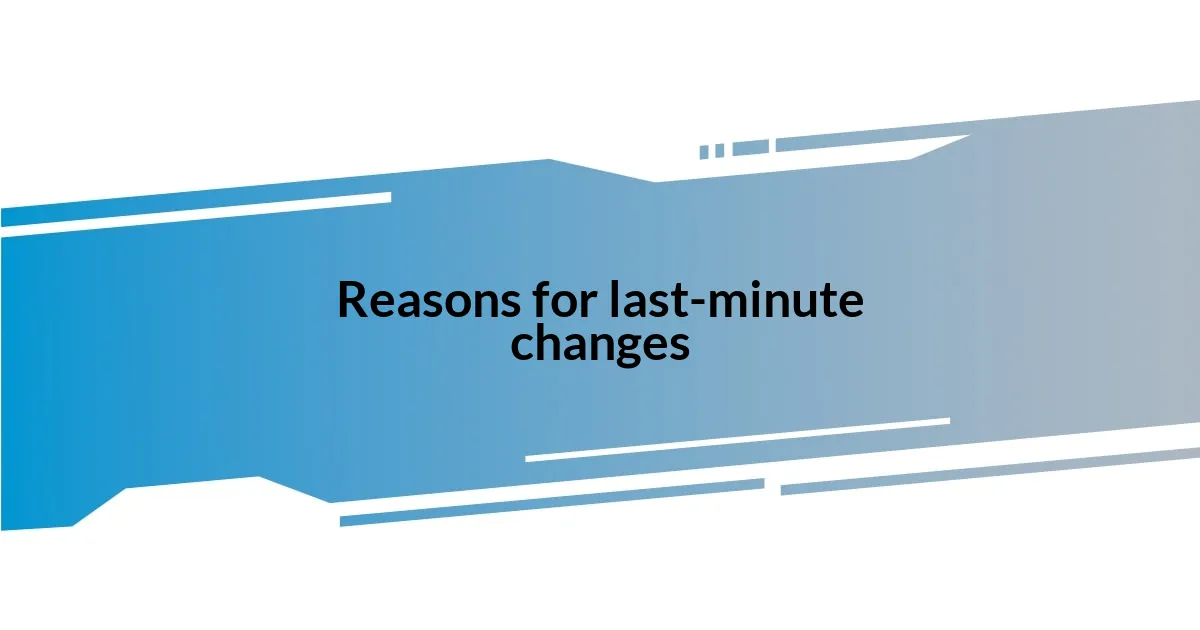
Reasons for last-minute changes
It’s interesting how life can throw curveballs at the most inopportune moments. I once faced an abrupt venue change due to a plumbing issue just a week before a major event. The stress was palpable, but it taught me the importance of having a backup plan and being aware of the physical conditions of a venue long before the event date.
Another reason for last-minute changes can be a shift in the attendee guest list. I recall when a prominent speaker canceled on short notice due to a family emergency. I had to quickly rearrange the entire schedule and find a replacement who not only could fill in but would also maintain the event’s momentum. These moments can feel overwhelming, but they ultimately drive you to be resourceful and adaptable.
I’ve also seen unexpected factors like health guidelines or local regulations suddenly reshape plans. At one point, a venue I had reserved had to limit its capacity due to new safety mandates. It was a tough pill to swallow, but I learned to quickly pivot and explore alternate spaces that could accommodate our original vision without compromising safety. Each of these experiences reinforces my belief that preparation is key, yet flexibility is essential.
| Reason for Last-Minute Change | Description |
|---|---|
| Facility Issues | Unexpected damages or repairs can suddenly render a venue unusable. |
| Guest Changes | Last-minute cancellations or additions can impact the event’s logistics. |
| Regulatory Changes | New guidelines or laws can prompt immediate venue adjustments for compliance. |
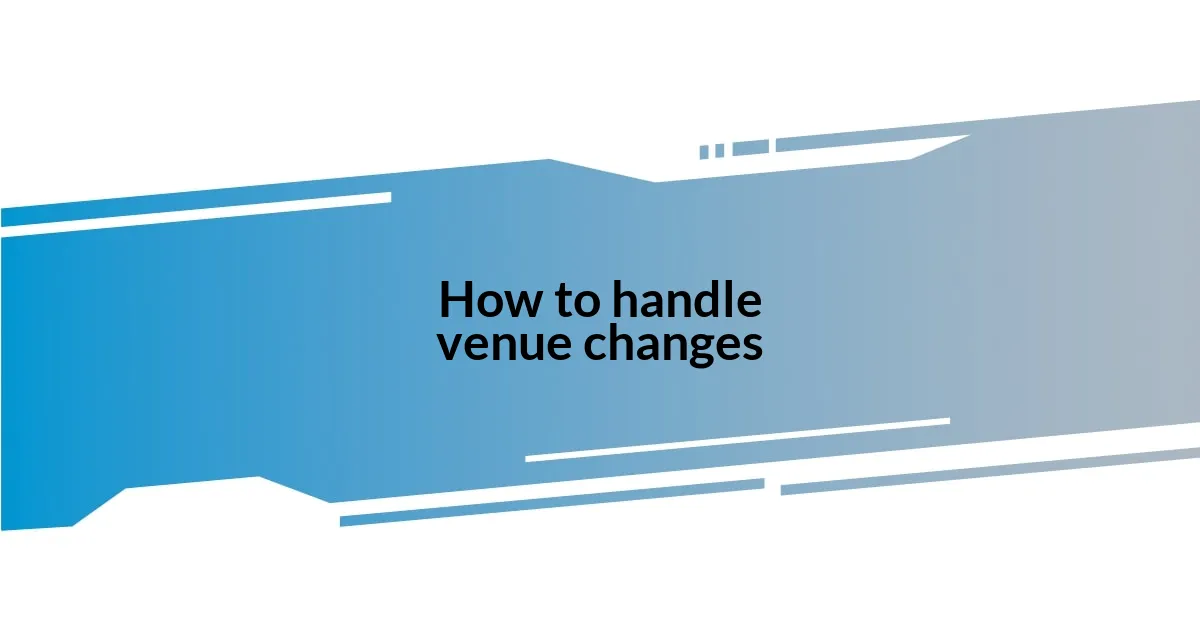
How to handle venue changes
When faced with a sudden venue change, staying calm and organized is crucial. I remember a time during a significant corporate gathering when our chosen venue became unavailable due to a last-minute conflict. I quickly gathered my team, and instead of panicking, we brainstormed solutions and created a list of alternative venues. This collaborative spirit helped transform a stressful challenge into an opportunity for teamwork.
Here are some strategies that worked for me:
- Communicate swiftly: Keep all stakeholders informed immediately to reduce uncertainty.
- Assess your options: Quickly review all possible alternative venues and make a list.
- Prioritize essentials: Determine what aspects of the original venue are non-negotiable for the event.
- Stay calm: Emotions can run high, but maintaining composure helps foster a clearer thinking process.
- Be flexible: Sometimes, going with the flow can lead to unexpected but delightful outcomes.
Handling a venue change isn’t just about logistics; it’s also about mindset. During one event, I had to relocate to a smaller venue just days before the big day. Initially, there was a sinking feeling in my stomach. But as we adapted the layout, I realized we could create a more intimate atmosphere. That unexpected twist turned out to elevate the experience, and I found myself cherishing the intimacy that the new venue provided. Embracing such moments helps foster resilience, making each event a new learning experience.
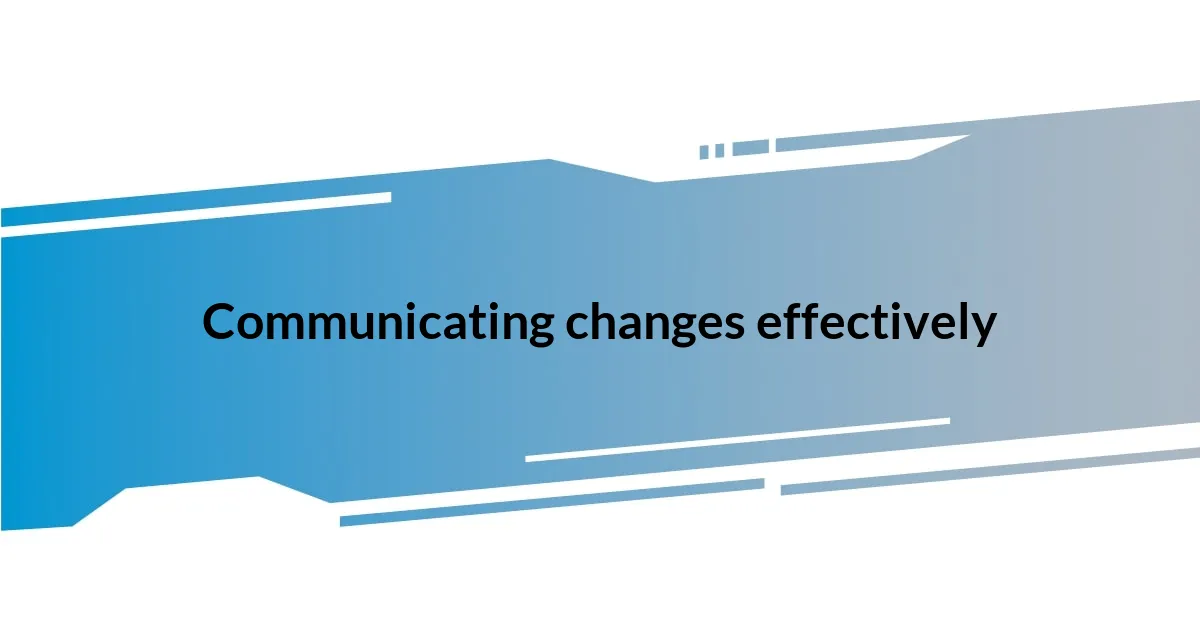
Communicating changes effectively
Communicating effectively during last-minute venue changes can feel like a balancing act between urgency and clarity. I remember one time when we had to change a venue just two days before an event. I quickly crafted a clear and concise email to all attendees explaining the situation—highlighting the new location, reasons for the change, and what to expect. It was rewarding to receive responses thanking me for the transparency, which reassured me that clear communication eases anxiety.
In addition to emails, I turned to social media to spread the word rapidly. I shared a post on our event page, and even updated the venue details in our RSVP platform. This tactic allowed me to reach a wider audience and ensured no one would miss the important details. I often wonder, how many people feel reassured knowing they’re well-informed?
One major lesson I took away is the importance of a designated point of contact for questions. Setting this up not only empowers team members but also provides a streamlined way for attendees to voice concerns. During another chaotic venue change, having that single line of communication made all the difference, allowing me to focus on logistical adjustments while still addressing any questions attendees had. In hindsight, effective communication transformed what could have been a daunting situation into a collaborative effort, bridging gaps and building trust among everyone involved.

Tips for a smooth transition
When navigating a last-minute venue change, flexibility is essential. I recall a time when an unexpected storm forced us to relocate our outdoor event indoors just hours before the start. Instead of viewing this as a setback, my team and I embraced the opportunity to rethink our design and flow. The intimacy of the indoor space actually sparked creativity in our arrangements, leading to unexpected conversations and connections among attendees. Don’t you find that sometimes, spontaneity can bring out the best in us?
It’s also important to keep your team tight-knit during these transitions. I encourage regular check-ins, which help foster a collaborative atmosphere. During one event, we faced a sudden layout change, and instead of assigning tasks, I invited everyone to contribute ideas freely. This not only distributed the workload but also made each team member feel valued and engaged. Have you experienced that exhilarating rush when everyone collaborates toward a common goal? In my experience, it brings not just efficiency but a stronger team bond.
Lastly, I believe that a quick debrief after the event is invaluable for learning. After we successfully executed a venue change once, my team and I gathered to discuss what worked and what didn’t. This isn’t just about fixing mistakes; it’s about celebrating our adaptability and celebrating small wins. How often do we overlook the power of reflection? Each post-event discussion equips us with insights for future challenges, transforming every last-minute hiccup into lessons learned and shared experiences.
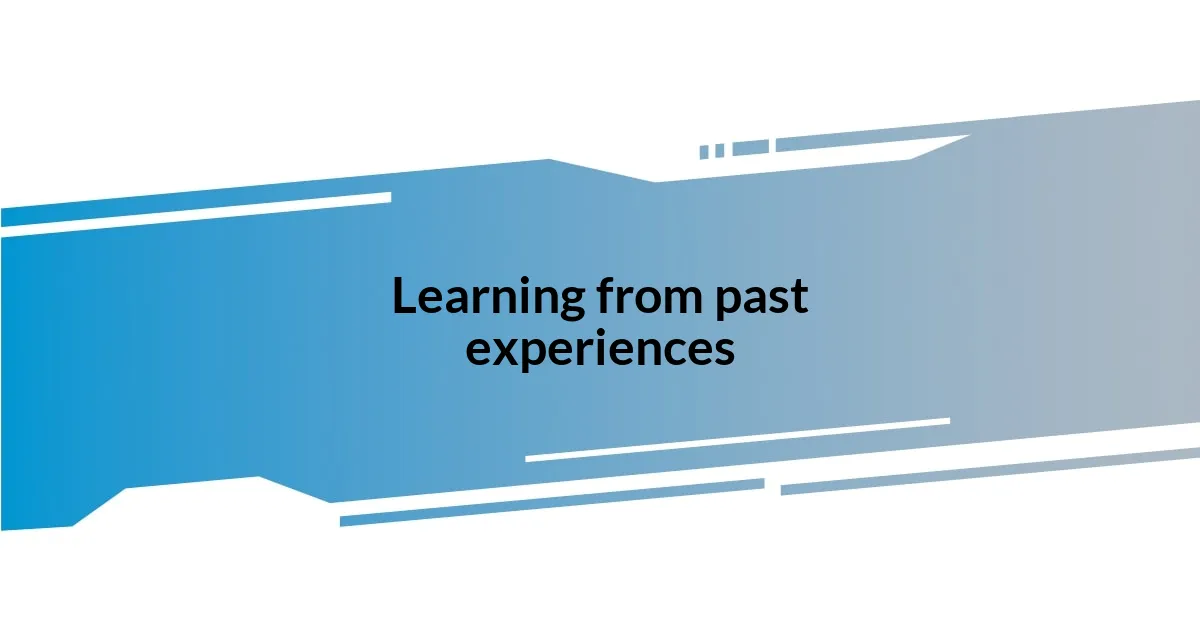
Learning from past experiences
Reflecting on past experiences teaches me that every venue change holds a lesson waiting to be uncovered. I remember once when we had to pivot our event just a few hours beforehand due to a double-booking. The scramble was intense, but I learned to embrace chaos as a means of igniting creativity. I can’t help but ask, has a sudden challenge ever propelled you to come up with a solution you thought you’d never find?
Experiences like these sharpen my instincts for future planning. After the last-minute relocation that required us to adapt our audiovisual setup, I started compiling a checklist that included contingency plans for different scenarios. Each time I review that checklist, I feel a sense of empowerment, knowing that I’ve built a safety net for smoother transitions. It’s fascinating, isn’t it, how a single experience can lead to an evolving roadmap that guides future decisions with greater confidence?
Moreover, I’ve realized that vulnerability in sharing these lessons fosters trust within the team. During a particularly hectic venue switch, I shared my own feelings of frustration with everyone, inviting them to voice their concerns too. It transformed our dynamic; suddenly, raw honesty created a supportive space. Have you ever noticed how authenticity can strengthen relationships? By learning from past experiences and encouraging openness, we build not just a stronger team but a resilient one that thrives in the face of uncertainty.